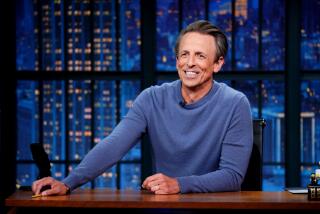TV News Too Trivial to See the Big Picture
- Share via
It is a staggering news story--the crumbling of communism as the sole official truth in the nations of Eastern Europe and now even in the Soviet Union. There will not be many bigger stories this century, if ever. Yet the TV networks, try as they may, simply seem unable to get a grasp on the monumental proportions of the almost surreal events. There is a reason:
Television news is finally paying the price for what it has let itself become--increasingly shallow and trivial, with endless and meaningless tidbits on show biz, airhead local anchors, inane sports reporters, clownish weathermen, all combining to create an audience that is turned off by lengthy discussion and depth. Except when the real in-depth reporters--Oprah and Geraldo and Donahue and Sally Jessy--deal with the genuinely important stuff.
Sure, the networks have done a terrific job reporting the breaking story of the decline of communism--which is only mind-blowing. But do you get the feeling that the enormousness of the events in Europe simply hasn’t registered with the impact it should on viewers? Well, how could it, given the way TV has conditioned them, and the new priorities of TV news--drama, extreme brevity, instant gratification, anything to prevent the viewer from zapping?
But the upheaval in Europe is a story that cries out for an ongoing, Olympian TV perspective to match the events, something you could count on in the years when Ed Murrow and Eric Sevareid and the team of Chet Huntley and David Brinkley typified network news departments that were not only able, but also expected, to provide such insights on a regular basis in prime time.
There is no other way for TV to do justice to a story that brings forth extraordinary dispatches such as the following, datelined Moscow: “The Communist Party that for decades swore its red tide would cover the globe bowed to a different revolution today and agreed to allow alternative political parties to compete for control of the Soviet Union.”
Holy smoke, folks.
But where’s the beef--that Olympian perspective on television? “Nightline” isn’t enough, good as it is. Nor are the analyses offered by the networks when time allows, and that’s not nearly often enough.
No, what’s needed to bring home the stupendous implications of the slippage of communism is a type of programming that TV news executives now hate and have already killed off in their mad race for ratings. And that is good old “talking heads” journalism, brilliant minds sitting back, discussing at length what is happening in Europe and explaining what it all means to a world that has been fighting this battle for most of the century.
A pipe dream, right? I mean, Maury Povich could knock it off in five minutes on “A Current Affair.” Or maybe there’s a quickie approach for “Inside Edition.” Or perhaps there’s a cocaine angle for “The Reporters.” Or Mikhail Gorbachev could pop in on “Saturday Night With Connie Chung” between interviews with Jack Nicholson and Bette Midler. Or “America’s Most Wanted” could re-enact the whole communism bit.
Boy, are we in trouble.
The networks were surprised when the freedom demonstrations at the Berlin Wall didn’t draw higher viewership. Maybe, suggested a sardonic observer, the subject would have drawn greater interest in a discussion on the Oprah Winfrey show.
Boy, are we in trouble.
And it comes right from the top. There are TV news directors and anchors today--many with no print background, especially in local markets--who pay lip service to the Murrow era but can’t stand hearing about it. And no wonder, when you realize how pitifully they stack up against it.
Viewers are getting wise to them. But it may be too late, because viewers may now be the real problem--brainwashed into acceptance of triviality and unable any longer to sit still for a talking-heads discussion or for the good, solid documentaries and instant prime-time news reports that used to be on every week.
Could Dan Rather, Tom Brokaw and Peter Jennings let up on their globe trotting a bit and conduct full-scale, multipart, talking-heads perspectives in prime time? Of course. But are we too brain-dead to listen to serious talk after all the goo-goo on the local news and the jokes with Fritzie and Freddie?
TV news has been decimated by so many factors--except on CNN--that you wonder who to look for when a story like the crack in communism comes along. Who could grasp the extraordinary dimensions of the subjects to be discussed and ask the outrageous questions that are worth endless hours of talk? For example, who was closer to the truth about communism--liberals or conservatives? If that’s not more exciting TV than “The Hogan Family,” then I’ll go quietly. And how about the years of dispute over communism between Hollywood’s right-wing and left-wing elements? You mean that’s not hotter stuff than “Falcon Crest”?
I’d like to hear Ted Koppel or Bill Moyers or Roger Mudd or Brinkley discuss these questions and all the others.
The trouble with the networks is that they keep sending Rather, Brokaw and Jennings everywhere, sometimes when it’s not worth it; and therefore, good as they are, they simply don’t quite have the stature of a Murrow. And perhaps that’s another reason, in the TV era, why viewers--who are linked to events by anchors--seemingly haven’t been caught up fully in the extraordinary drama of Eastern Europe.
There really is no single TV journalist in this era of fragmented audiences who constantly pulls us all together and dramatically drives home a giant story so we all feel it personally, the way Murrow did on radio during the Battle of Britain in World War II, and the way Walter Cronkite did during the early years of manned space flights.
Koppel could do it. He is, to many, the Murrow of our time. He pulled us all together during the Iran hostage crisis. He is off again in South Africa this week and next, illuminating the sweeping reforms that the long-embattled nation has made in its apartheid policy. And he would seem the perfect man for ABC to simply turn loose for a few months, or however long it requires, when a story of the size of the Eastern European revolts comes along.
Something has really got to happen to prevent viewers from getting dumber and shallower about current events because of TV news. You have to wonder how much the increasing lack of depth and perspective in TV news is contributing to the dreadful history scores in surveys of high school subjects.
Will the lessening of substance in TV news allow events to fall more and more into the formats of revisionist docudramas that make up facts, tabloid shows that don’t care about them and sensationalist talk-show hosts who unblinkingly allow celebrity guests to fill the air with fibs and fluff?
In the end, though, it’s not TV news we have to worry about. It’s us.
Stay tuned. Or better yet, don’t.
More to Read
The complete guide to home viewing
Get Screen Gab for everything about the TV shows and streaming movies everyone’s talking about.
You may occasionally receive promotional content from the Los Angeles Times.






